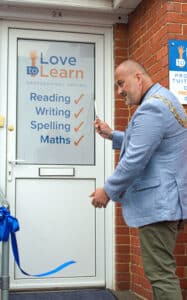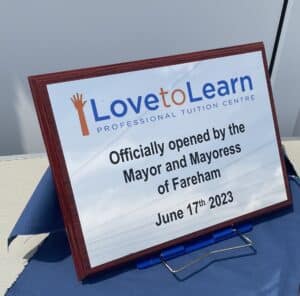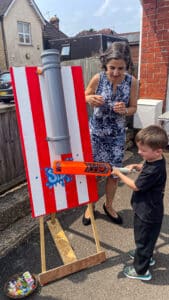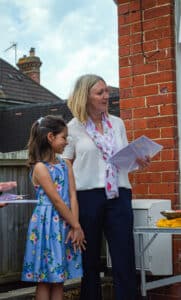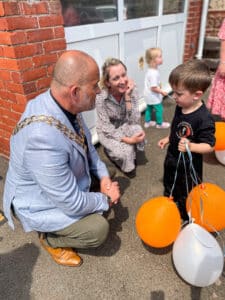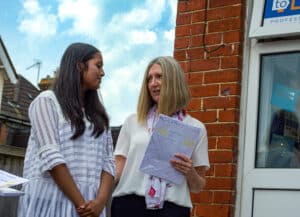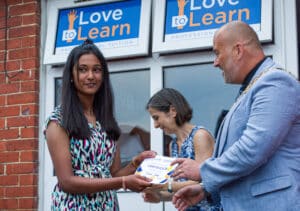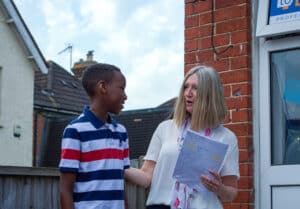Official Launch Day 17th June 2023-Pictures
The Mayor and Mayoress of Fareham have officially opened our brand new centre
We are excited to be welcoming the Mayor and Mayoress of Fareham to open our bespoke tuition centre in central Fareham on Saturday 17th June. We want to extend a warm invitation to you whether you are a past, present or potential user of our professional tuition services.
The event is taking place from midday. Fun, games and live music are all on the agenda! We will also be announcing the winners of our Royal Writing competition with the Mayor and Mayoress presenting the royal prizes.
We do hope you can join us!
SATs HELP FOR BUSY PARENTS
SATs Help: How can busy parents help their children facing Year 6 SATs?
When and How?
Age 11 early May of Year 6: SATs in English and maths, marked externally, results published nationally. Teacher assessment in science.
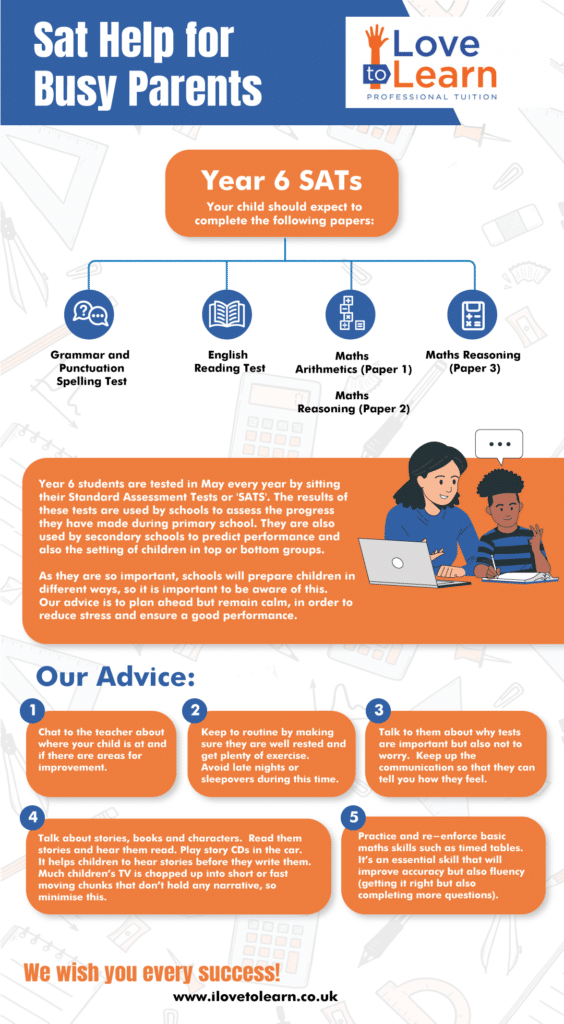
Year 6 SATs
Date |
Test |
|
Grammar and Punctuation Test-45 mins
Spelling Test-20 mins |
|
English Reading Test-60 mins |
|
Mathematics Arithmetic (Paper 1)-30 mins
Mathematics Reasoning (Paper 2)-40 mins |
|
Mathematics Reasoning (Paper 3)-40 mins |
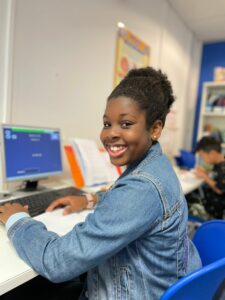
Day 1: Grammar and Punctuation
Spelling Test
Day 2: English Reading Test
Day 3: Maths Arithmetics (Paper 1)
Day 4: Maths Reasoning (Paper 2)
Maths Reasoning (Paper 3)
Obviously, the children will be aware that there is something going on and that they are going to be tested. During Year 6, your child will undoubtedly get plenty of exam practice and specific work on how to answer particular questions in exams, particularly in regards to the reading comprehension exam. Some schools will put on more pressure or expect more revision than others, with many offering extra tutoring either before or after school. It may be a motivator for some kids to try and bit harder, however, many find it stressful.
Our Advice:
You can also help your child at home in the following ways:
Chat to the teacher about where your child is at and if there are areas for improvement.
Keep to routine by making sure they are well rested and get plenty of exercise. Avoid late nights or sleepovers during this time.
Talk to them about why tests are important but also not to worry. Keep up the communication so that they can tell you how they feel.
Talk about stories, books and characters. Read them stories and hear them read. Play story CDs in the car. It helps children to hear stories before they write them. Much children’s TV is chopped up into short or fast moving chunks that don’t hold any narrative, so minimise this.
Practice and re-enforce basic maths skills such as timed tables. It’s an essential skill that will improve accuracy but also fluency (getting it right but also completing more questions).
Suggested Links:
Here is a link to Past Papers:
KS 2 Year 6 Grammar, Punctuation, Spelling Past Paper
KS 2 Year 6 Reading Assessment Booklet
KS 2 Year 6 Reading Assessment Questions
KS 2 Year 6 Maths Paper 1 (Arithmetic)
KS 2 Year 6 Maths Paper 2 (Reasoning)
KS 2 Year 6 Maths Pape 3 (Reasoning)
 We recommend Andrew Brodie books especially for maths.
We recommend Andrew Brodie books especially for maths.
Also CPG SATs revision books are great for maths and English.
In the end it is better that issues are flagged up now if they need extra support. SATs should be information for you and the school about your child’s progress rather than their performance. If you would like to book a free assessment with us to get professional advice then click here…
Who Our Tuition Is Not Suited For?
A Guide to Who Will Not Benefit From Our Tuition Service
We want parents and children to get the best out of our tuition service. The last thing we want to do is waste anyone’s money on something that is not for them.
Here is a guide to help parents decide if we are the right service for their child or children.
Last minute exam prep-esp GCSE

We are not able to cram for exams. Our tuition is designed to look for areas of weakness that students might have. We may need to go back a few years (educationally) to work on skills that students may have missed. This can take some time, and if you (or the student), are too focussed on an exam you might become frustrated. We are aiming for mastery and not just short term exam performance (that will probably be forgotten the day after the exam!)
SEN
We are not a specialist special needs centre. However, if we meet children for an assessment and feel we can work with them, we take them on. There are a few students, maybe their behaviour is too bad or maybe they can’t speak any English, who we find it difficult to help. The best thing to do is book in for a free assessment and we will give you our honest opinion.
Can’t Attend a Centre Regularly
Regular attendance at lessons is essential for progress. In many cases we only get 80 minutes once a week. We do not want to waste anyone’s money, so if you cannot attend regularly, we may not be the place for you.
If You Want Online Tutoring
We do not have an online offer at the moment. We still feel in centre tutoring is of a much higher quality than online, and that most children needs teachers to be present.
Free or Cheap Tuition
Good quality tuition by professional and experienced tutors does cost money. We have to provide a great learning environment and pay for fantastic, experienced and qualified tutors. We try to provide the best tuition that money can buy but we quite understand that it is not in everyone’s budget. We are committed to helping your child make progress so please don’t try to drive down our prices.
Common Questions About Our Tuition Services
Ask A Question And We Will Answer
In this article we answer some of the common questions that parents ask. We hope that you will find it useful.
Is it One to One?
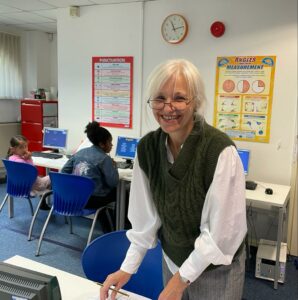 Yes, but each tutor has four or five students at a time. They are able to give each student one to one attention, even though they may be learning different subjects or be different ages. Each week, the tutor will plan a individual programme for your child to help them with any areas of weakness. Because all the planning and resources are prepared in advance, the tutor is able to teach each student something new each session.
Yes, but each tutor has four or five students at a time. They are able to give each student one to one attention, even though they may be learning different subjects or be different ages. Each week, the tutor will plan a individual programme for your child to help them with any areas of weakness. Because all the planning and resources are prepared in advance, the tutor is able to teach each student something new each session.
Will you Come to Our Home?
No, all of our tutoring is done in our centres so your child has access to all of our learning packages and technology in an optimal learning environment, without any distractions. Try homeschooltutoring…
Do You Do Online Tuition?
No, we do not have an online offer at the moment. We feel that we can deliver the best quality lessons in person and we feel that children respond better when teachers are present in the room.
the room.
How long will it take to solve my child’s problem?
Every child is different, so it’s important they come in for a FREE Assessment so we can come up with a plan and goals, for them to work towards. We don’t know how long it will take, but we promise to give you honest feedback about progress. Every session that your child attends is individually planned and adapted to suit their particular needs. We aim to unlock areas of difficulty as soon as we can for each child.
How do I know that my child will improve?
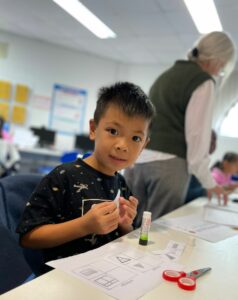 We guarantee to work with your child until they feel confident to flourish and no longer feel daunted by the problematic area. Combined with our expert tutoring, their school work and extra homework from us; your child will feel supported, encouraged and will make progress in the areas you are concerned about.
We guarantee to work with your child until they feel confident to flourish and no longer feel daunted by the problematic area. Combined with our expert tutoring, their school work and extra homework from us; your child will feel supported, encouraged and will make progress in the areas you are concerned about.
Can you tutor my child with a Special Educational Need?
We are not a SEN centre, but because we tailor our lesson plans to the specific needs of each child we have taught children with diagnosed ADHD, Aspergers, Dyslexia, Autism and others in the past. If your child falls into one of these categories it’s very important you get in touch and set up an interview with us and an assessment. Then, we can establish whether we can effectively tutor your child.
Our Portsmouth Centre has wheelchair access and the use of a disabled toilet. We want to offer the best for all the children we tutor, so this is a very important process. We are always willing to go the extra mile regardless of any special need. Please call for more details.
If you have a question or concern why don’t you email us at tutors@ilovetolearn.co.uk
11+ Entrance Assessments 2025/26
Independent Schools in Portsmouth, Fareham & Havant
Greetings, parents! In the Portsmouth area, you’ll find a variety of independent schools, each offering its own unique blend of educational ethos and environment, ranging from the grand to the intimate, and spanning a spectrum of academic rigour. We take great pleasure in assisting children with their preparation for the 11+ common entrance assessments, recognising the significance of this milestone. Additionally, we recognise the importance of ensuring everyone is well-informed regarding relevant dates and schedules. We’ll be sure to keep you updated on that front.
Scholarships
Academic Scholarships may be awarded to the top achievers based on the results of the school’s 11+ assessment. The criteria for this will vary from school to school, so you must apply directly to them.
Additionally, some schools offer scholarships for excellence in Art, Drama, Music, and Sport at 11+, 13+, and Sixth Form. These need to be applied for, and applications are usually submitted by the end of November preceding the September of entry. You can apply for more than one scholarship.
Financial Assistance
Some schools may offer financial assistance (means tested on income and exam performance) for Year 7 and Year 9 entry, and the deadline for applying is normally the end of November (September in the case of Portsmouth Grammar School), prior to the year of entry. Often, financial assistance is allocated first and foremost based on the child’s exceptional performance in the Entrance Assessments; the financial information you provide is then considered.
N.B. Please note that advice given here may vary between individual schools. It is important that you get in touch with individual schools to find out their exact criteria for entry requirements, scholarships, and financial assistance.
Common Entrance Assessment or 11+
This exam is so called as it is taken at the age of 11 years at the beginning of secondary education. Not all independent schools are selective, but almost all schools will want students to take an entrance assessment exam of some kind.
The entrance exams always cover maths and English to a high level. Children are also usually tested on their verbal and nonverbal reasoning. These tests are designed to be more difficult to prepare for as they are not school subjects. Verbal reasoning is concerned with language and word problems, while non-verbal reasoning includes logic, shape, and number patterns.
The 11+ Assessments typically consist of the following: Maths (50 mins); English (45 mins); Reading Comprehension (30 mins); Non-verbal Reasoning (30 mins); plus an Interview (20 mins).
Full Bursary
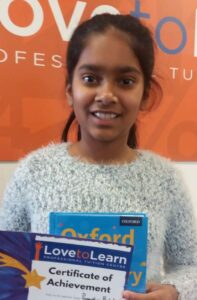 “We are so pleased that Mahera has got a FULL BURSARY for the local girl’s high school in Portsmouth. She has been to your centre before for tuition, but we came back in November so she could get ready for the exams. She has worked so hard and Linda has really encouraged her in her writing! Thanks so much!”
“We are so pleased that Mahera has got a FULL BURSARY for the local girl’s high school in Portsmouth. She has been to your centre before for tuition, but we came back in November so she could get ready for the exams. She has worked so hard and Linda has really encouraged her in her writing! Thanks so much!”
Click here to read more about our success…..
Portsmouth Grammar School
11+ and 13+ Entrance Assessment
Saturday 8th November 2025
(Deadline for registering is Friday, 26th September 2025)
Mayville High School
All Candidates Sit Exam
Saturday 15th November 2025
Portsmouth High School for Girls
Music, Art, Drama & Sport Scholarship Day
Monday 5th January 2026
11+ Assessment Day
Tuesday 6th January 2026
The Gregg School
11+ Entrance Assessment
Saturday 24th January 2026
Meoncross School
Open Week: 22- 26th September 10.45am 2025
Open Morning November Friday 21th November 10.45am 2025
Boundary Oak School
Assessment can be booked all year
Are you considering entering your child for an independent school? Then book a Free Assessment today!
NOW IS THE TIME
If your child is currently in Year 5, then NOW is the time to start preparing for the entrance assessment exam in January.

During your child’s free forty-five-minute assessment we will:
- Test your child’s reading age, spelling age and maths ability.
- Give you honest feedback on your child’s ability to pass the entrance exams for each school.
- Discuss our previous experience preparing students for entrance exams for local independent schools.
- Give you a breakdown of the topics your child needs to cover to prepare for the entrance exam.
- Explain our materials and teaching methods to you.
- Give you the chance to ask any questions and to tap into our expertise.
Click here to find out more about tutoring for Entrance Exams …
Where Are They Now?
I Love to Learn Find Out What Happened to Some of Our Ex-Students
Having tutored children in Portsmouth since 2005, many of our students have gone on the better things. Occasionally I notice on LinkedIn or Facebook what people are doing now. I thought I would share a couple of stories:
Tom Malbon

Tom studied English with us over ten years ago. He says “I would say that the tuition was a big help early on when I was struggling with grammar and spelling and helped me get on track to achieve in later years.”
He is currently in his second year studying BEng Hons Mechanical Engineering at Oxford Brookes University with the aim to achieve a career in Formula one. He is also an active part of the Aerodynamics department at Oxford Brookes Racing as they aim to participate in various Formula Student competitions across Europe.
Great to hear from you Tom!
-
Mary Amalathas
Mary also came to us for help with English and was always a very hard working student. She recently started her own Accountancy practice called ‘Accountants247 Portsmouth’ offering various Accountancy services for sole traders, companies and contractors. She says, “I have a team who help with some aspects of my work. Currently I am also providing interim Accountancy work for a corporate company.”
Accountancy services for sole traders, companies and contractors. She says, “I have a team who help with some aspects of my work. Currently I am also providing interim Accountancy work for a corporate company.”
“Linda had helped me tremendously by going above and beyond in various aspects of preparation for my GCSEs, including a one-to-one for Science which was not even offered by the tuition centre at the time. The only regret is that I didn’t join ‘I love to learn’ any sooner. I can safely say that I got through some subjects like English Literature only because of Linda’s guidance and the techniques she taught me. I am forever grateful to her. Linda takes great care and attention with each child she teaches.”
Thank you both for your kind words!
School Led Tutoring Programme
Can I Love to Learn Professional Tuition Help You with the School Led Tutoring Programme?
- Introduction to I Love to Learn Education Centre
Opened in 2005 has become the premier service for maths and English after school tuition in Portsmouth. Since then we have helped hundreds of students turn around their skills and confidence in the area of maths and numeracy. Our tutors are all fully qualified and experienced classroom teachers. We now have centres in Portsmouth and Fareham with plans to expand further. Demand is very high at the moment and we teach a range of children from Year 1 to Year 11 in both of our growing centres.
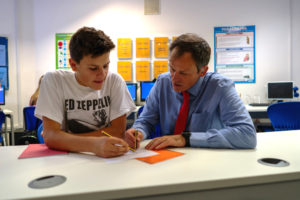 Working with Schools
Working with Schools
Are you looking for partners to deliver your National Tutoring Programme ?
In January 2020 we were tutoring maths at Havant Academy with small groups of Yr 11 students. We therefore have direct, current experience of delivering small group tuition in schools.
Over the years we have worked with a number of schools including Ark Dickens Primary (Portsmouth), Priory School (Southsea) and taught many LAC through Action for Children and other fostering organisations.
- Our Tutoring Programmes
Here at I Love to Learn, we have experience in designing individual programmes for pupils. We focus on either English or maths to boost pupil’s achievement and support them to make more than expected progress. At the moment we are only offering maths tuition at the secondary level.
We provide an individual initial assessment which will baseline student’s current level of attainment.
We then plan a bespoke programme which is delivered by our qualified, experienced teachers using our unique resources.
Additionally, we can track the progress that your pupils make on our plans.
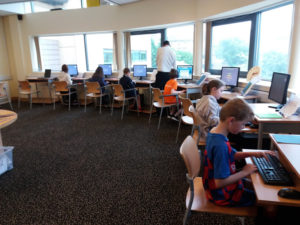 Small Groups
Small Groups
The tutoring takes place in small groups of 3. We find that individual tuition delivered in small groups reduces the pressure on students, and is more motivating, as they are working alongside others. We would emphasise that it is not small group work, as each child does different work suited to their level of ability.
Effective feedback-This is delivered by the tutor monitoring and marking the child’s progress throughout the session. The tutors are trained to give praise for good effort and progress, when it is deserved. Stickers and stamps are given out as/ when work is completed to gain prizes/rewards. Our computer tuition resource gives instant feedback to tutors and children.
Homework-we set homework that is often a repeat of work that has already been done in their session. We use this to check that children can complete it independently and to analyse areas of weakness that need to be re-enforced. This also links with parts of the programme carried out in the centre and is therefore progressive.
ICT-All the students use ICT in the lessons with the sessions being planned and delivered with our numeracy programme. This includes a combination of written and computer activities, but all marking and progress is recorded. Right and wrong answers can be tracked. Many of the activities are first written and then re-enforced with a computer activity .
Base Line Assessment: we test each child’s reading age, spelling age and writing/maths skills depending on the subject/subjects requested. We use this to plan where each child starts in our tutoring programme. The work is tailor made to target the child’s specific weaknesses. With greater success the child’s confidence and enjoyment returns, and they are able to re-engage with the learning process.
- Delivery of Secondary Maths & English Programmes
KS3 Numeracy
- 60 minute session
- Warm up:Tables
- Core Maths 1 to 9
- Core Skill Builder
- Target GCSE Maths Area 1
- Target GCSE Maths Area 2
- Games-arithmetic
Students are given one sheet of core maths homework at the end of the session.
Our focus is on improving fluency as well as accuracy with number and & then higher-level skills. With the basic skills secure we can then focus on other KS3 topics. We set a mixture of at least six activities lasting from 5-15 minutes each.
KS3 Literacy
- 60–minute session
- Warm up: reading or vocabulary
- Core Skill English Grammar/Punctuation
- Core Skill Builder Comprehension
- Target Grammar
- Target Writing/Planning/ Proof Reading/Re-Writing
- Games-Spelling
Students are given one sheet of core mixed homework at the end of the session.
We aim to build skills across the range of literacy targets depending on the areas of weakness displayed by the student. With the basic skills secure we can then focus on KS2 written expression and writing for purpose. We set a mixture of at least six activities lasting from 5-15 minutes each.
Re-Assessment and Reporting
A base line score is recorded at the beginning of the pilot.
Individual Report-work done, and progress is recorded on our paper plans each lesson.
We re-assess at the end of the period and provide a full report to show progress. This can be sent hard copy or by email.
- Example Pilot
Pilot to assess the effectiveness of the maths & English tuition programme offered.
Students chosen by school
Start with 2 groups of 3 students from any year
Cost of session is £18 per student per hour
5 weeks -2 sessions per week or 10 weeks- 1 session per week
80 sessions
Cost of Pilot
Cost is 10 session x 8 students x £ = £1,440
Resources needed
Any quiet workroom
All other resources will be provided
Conclusion:
We are committed to providing the best possible service in whatever way possible. We have worked closely with schools, fostering agencies and the City Council in the past to widen our offer. We have taught SATs boosting class for a local Primary School who visited our centre.
We are looking forward to working together with you!
How to Analyse Poetry for GCSE English Literature?
Here is some advice for students or GCSE English Literature
Here is some important advice for students preparing for their literature exam. They need to know the books and poems that they will be examined on. The more planning and preparation they put in the better.
Get Familiar With the Exam

English Literature GCSE is divided into two papers. Paper 2 (2hrs 15mins, 60% of the marks) is in 3 parts. Parts B and C are on poetry.
B- You will answer one comparative question on one named poem printed on the paper and one other poem from your chosen anthology.
C- You will answer one question on one unseen poem and one question comparing it with a 2nd unseen poem.
How to Analyse Poetry for GCSE English Literature
-
What is the poem about?
e.g ‘This poem is about the narrator’s experience of the war’.
-
What is the purpose (or theme/message) of the poem?
- Why has the poem been written?
e.g. ‘The poem has been written to enable the reader to feel the trauma of war’.
-
What emotions, moods and feelings are being communicated?
e.g. ‘The general atmosphere the narrator creates is one of fear and the futility of war’.
-
What techniques does the poet use to create the emotions, mood or feelings?

Success!
- You will need to identify and name different technical terms that are used in the poem.
e.g. ‘The poet uses repetition of the word ‘fear’ to emphasise how frightened everyone was.
Techniques that may need identifying are:
Form- The rhyme and rhythm of the poem, often relates to the overall theme. (Also changes in the lengths of lines or verses).
Imagery- Does the poet use language that creates an image in your mind?
Structure- What is the order in which ideas are created? Is there a key point at which the mood or focus changes?
Literary devices- Poets use numerous devices to communicate their ideas and emotions. These can include: similies, metaphors, alliteration, personification, enjambment, caesura, hyperbole, onomatopoeia, oxymoron and rhetorical questions.
-
What do you think about the poem?
e.g. ‘ The poem makes the reader feel the narrator’s fear from the battle as well as the overall futility of war’.(Avoid using ‘I’).
– Are there other ways the poem could be interpreted? (Ambiguity)
Click here if you would like to find out more about our English tutoring….
Additional recommended resources:
Unseen Poetry-The Poetry Guide for the grade 9-1 course (CGP)
Power and Conflict- The Poetry Guide for the grade 9-1 course (CGP)
Love and Relationships- The Poetry Guide for the grade 9-1 course (CGP)
Helping Confidence Bloom-A Case Study
Confidence
Eleanor’s mum said, “With the disruption during Covid, Eleanor lacked confidence in some subjects. I wanted to improve her self-belief in her academic abilities. Eleanor felt good about the free assessment and actually enjoyed it!
 Since enrolling, Eleanor says that the tutoring at I Love to Learn has given her more confidence to speak out in class, especially in maths. She is happy to ask questions during the sessions and the homework is a repeat of (some of)the lesson which helps her remember the learning.
Since enrolling, Eleanor says that the tutoring at I Love to Learn has given her more confidence to speak out in class, especially in maths. She is happy to ask questions during the sessions and the homework is a repeat of (some of)the lesson which helps her remember the learning.
“It’s Been Like Watching a Flower Bloom”
The greatest change in her, since coming to I Love to Learn, was her confidence in her own abilities. Slowly, after 3-4 months, she suddenly burst out having engaged with, and enjoyed, the creative writing at school, after they studied Macbeth. Ellie was so proud of her work that she brought it to show Linda. Fantastic! And the girl, that was always so negative about maths, has realised she can do it and now engages so positively in school. It has been like watching a flower bloom. Thank you so much. ” explained Eleanor’s Mum.
Top GCSE Revision Tips
How to Make Your GCSE Revision Awesome!
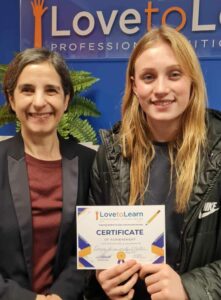
Effective study skills can often make good students into great students. Here are four great study habits to help your GCSE student get the most out of their learning potential.
- Study Planner- students will know the topics they need to give special attention to. A long term plan of the year ahead helps to avoid last minute cramming before exams.
- Study Schedule- regular study sessions on a timetable will make life easier as it becomes part of the daily routine.
- Study Time- designate a ‘communication blackout hour’ , no phones, messaging, gaming or TV.
- Study Space- create a study area away from distractions, ideally a quiet, well lit area, with materials to hand.
Understanding Your GCSE Exams
It is important to know what you are preparing for! For GCSE revision make sure you know; how many papers you will be taking in each subject, what topics will come up in each paper and which books to revise, for English Literature, for each exam. It is also helpful to know which exam board the school is using (it may vary between subjects) as it is helpful to be revising from the right past papers.
Make a Revision Programme
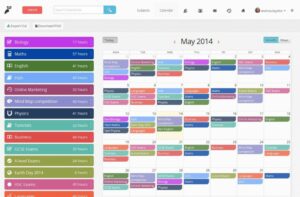
Make a plan to avoid the last minute rush! You don’t want to cram it all into the last minute. The best way to learn is to give yourself enough time to prepare for each subject. So, say you are taking five exams, you might schedule 10 hours of revision for each subject, so you need to find 50 hours worth of revision from somewhere! If you revise 2 hours every night that is achievable in a month. Some exams will need more revision than others, so it is important to plan accordingly for each one. You might have birthdays or other events that take up time, so make sure important dates are on your calendar and work round them. You also don’t want to be starting too early, although if you do, you can always plan to go over things again nearer the time.
Only Do Effective and Efficient Revision

Don’t over do it! Revision is hard and it is easy to get distracted. I found 2 hour blocks were the best with a short tea break. If you revise for long periods you tend to lose focus and time waste. Give yourself a reward at the end to look forward to.
Don’t just read your notes or the revision book. Make notes, revision cards are great, and sumarise what you need to know. With some subjects, such as History or Geography, you may be able to reduce your notes to a couple of pages of A4 paper. Other subject like languages you may need to produce flash cards and posters. I would always try to get my answers down to a single MNEMONIC (e.g. Richard Of York Game Battle In Vain for the colours of the rainbow). This meant I only needed to remember the Mnemonic and not all the causes of the First World War (Militarism, Imperialism, Alliances, Nationalism e.g. Meat Is Always Nice) or whatever the topic is.
When you have produced your notes, mnemonics or posters or whatever, you will then be able to use them for reminders and last minute revision nearer to the exam. This gives your brain the best chance to remember what you are revising as the information is repeated in several different ways.
Set Up a Dedicated Learning Environment
An important part of revision is having a dedicated place to study. This will need to be away from electronic distractions if possible! Leave the phone downstairs, turn the play station off, open the books and make some notes. Although the internet is amazingly useful for revision purposes, it is also amazingly distracting. I would suggest only allowing yourself a limited time to use the internet to revise, and then make sure you write it all down. It is too easy to find yourself watching TikTok or playing a PC game otherwise.
Use the Best Revision Resources
There are lots of excellent revision resources available on the internet for free now. I would also recommend revision work books which you need to fill in (writing the answers in full is what you will do in the exam). For subjects like maths or languages, these may be the best way to make sure you have sharpened your skills in all the areas needed. Good revision guides are also helpful for specific books that you need to know for English Literature. Revision books may also be useful if you have gaps in your own notes that you need to fill in.
Last But Not Least!
Eat well, get fresh air and sleep well. You brain is the organ that uses the most energy in your body. Energy comes from; eating good food, breathing plenty of oxygen and then resting, our brains need to recover. Don’t stop your sport/dance/exercise programme completely, even if you have to cut down, do try to keep these activities going. Make sure you get regular nutritious food (otherwise your stomach will be distracting you anyway, without you knowing), drink plenty of water and cut out the late night TikTok/Playstation/TV action!



